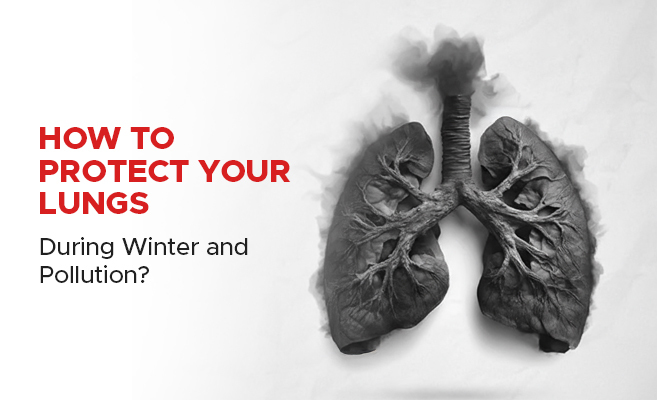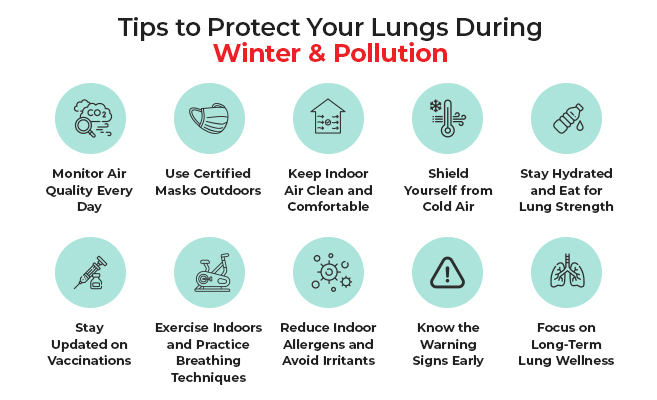How to Protect Your Lungs During Winter and Pollution?

Delhi winters are cold, dry, and often polluted. This mix can irritate your airways and trigger cough or wheeze. If you’re wondering How to Protect Your Lungs During Winter, this guide gives you easy steps you can start today.
To protect your lungs during winter and pollution check the Air Quality Index every morning. Avoid outdoor activities when pollution levels are high. If you must step out, wear an N95 or N99 mask for better protection. Indoors, use a HEPA air purifier, maintain 30-50% humidity and drink plenty of water. Quit smoking if you do, cover your mouth and nose with a scarf in the cold and stay up to date with flu and pneumonia vaccines.
At PSRI Hospital, the best hospital in Delhi, our pulmonology team focuses on prevention first and quick relief when symptoms rise. Read on for expert approved tips to keep your lungs protected this season.
10 Effective Ways to Protect Your Lungs During Winter and Pollution
Here is How to Protect Your Lungs During Winter and keep breathing comfortably:
1. Monitor Air Quality Every Day
The first step in lung protection is awareness. Track the Air Quality Index through your phone or local weather updates. Avoid outdoor workouts or travel on days when pollution levels are poor or severe.
Fine particles like PM2.5 can reach deep inside your lungs and trigger inflammation. This worsens breathing issues and increases the risk of long-term damage. By planning your day around AQI levels, you can limit your exposure and protect your respiratory health.
2. Use Certified Masks Outdoors
Simple cloth or surgical masks cannot block harmful pollutants. Only N95 or KN95 masks can filter tiny particles in the air. Always wear one when stepping out especially during early mornings or evenings when smog is thickest. Replace masks regularly and ensure a snug fit for full protection.
3. Keep Indoor Air Clean and Comfortable
Many people assume indoor air is safe, it often isn’t. Use a HEPA air purifier to reduce pollutants and allergens inside your home. Clean or change its filters on time. Keep your room humidity between 30-50% to avoid airway dryness.
A simple humidifier or a bowl of water near heat sources helps. Ensure proper ventilation and clean regularly to prevent mold, dust mites and pet dander buildup.
4. Shield Yourself from Cold Air
Cold air can make airways narrow leading to coughing or breathlessness. Always breathe through your nose, not your mouth as your nose warms and moistens incoming air.

Cover your mouth and nose with a scarf or mask when outdoors. Avoid sudden temperature changes such as stepping into cold air right after a hot shower.
5. Stay Hydrated and Eat for Lung Strength
Water keeps your airways moist and prevents dry air respiratory irritation. Drink warm fluids like herbal teas and soups.
Add citrus fruits, leafy greens and nuts to your diet. They provide vitamin C, vitamin D, zinc and omega-3 fatty acids, all known to support respiratory immunity. Include anti-inflammatory foods like turmeric, garlic and ginger.
6. Stay Updated on Vaccinations
Seasonal infections like flu or pneumonia can become severe during cold and polluted months. Get your flu vaccine, pneumococcal vaccine and if advised, the RSV vaccine.
These vaccines reduce the risk of viral respiratory infections and protect your lungs from complications. Always consult your pulmonologist for the right schedule.
7. Exercise Indoors and Practice Breathing Techniques
Avoid heavy workouts outdoors when air quality is poor. Instead, practice yoga or light exercises indoors. These help improve lung capacity and blood circulation.
Simple diaphragmatic breathing, deep breathing using your belly clears mucus and strengthens your respiratory muscles
8. Reduce Indoor Allergens and Avoid Irritants
Clean your surroundings to minimize indoor allergen reduction. Vacuum carpets, change bedsheets weekly and wash curtains often.
Avoid incense sticks, scented candles and secondhand smoke, as they irritate your airways. If you smoke, consider quitting it’s the most effective way to improve lung health.
9. Know the Warning Signs Early
If you have a persistent cough, chest pain, wheezing or fatigue it may not just be a seasonal cold. These can indicate airway inflammation, pneumonia or chronic respiratory disease.
Consult a pulmonary specialist for evaluation especially if symptoms last longer than two weeks. Early diagnosis prevents complications.
10. Focus on Long-Term Lung Wellness
Lung health is a lifelong habit. Continue these protective steps even after winter. Schedule regular check-ups for respiratory health monitoring. Maintain good ventilation, indoor exercise and a balanced lifestyle to build long-term immunity.
As a leading Delhi multispeciality hospital, we use advanced tools for respiratory disease early diagnosis and patient education. Our experts guide you through effective preventive care programs to ensure lasting lung strength.
Conclusion
Winter and pollution together create one of the toughest seasons for your lungs. Yet, simple daily care mentioned above can make a big difference.
If you feel short of breath, notice chest discomfort or have a recurring cough, don’t delay a check-up. Visit PSRI Hospital, the best hospital in Delhi for advanced lung and respiratory care. Our Pulmonology Department offers expert consultation, diagnostics and preventive health programs designed to keep you breathing strong.
Book your appointment today at delhi multispeciality hospital and take the first step toward healthier lungs this winter.
FAQ’s
- How does Delhi’s winter pollution affect lung health?
Ans. During winter, cold air traps pollutants near the ground. Breathing this polluted air exposes your lungs to fine particles that cause irritation, cough and breathing difficulty. - Can air purifiers and humidifiers really help?
Ans. Yes, a HEPA air purifier reduces indoor pollutants while a humidifier maintains moisture preventing airway dryness and irritation. - Are masks necessary for short outdoor trips?
Ans. Yes, even a few minutes in polluted air can harm your lungs. Always wear a N95 or KN95 mask outdoors during high-pollution days. - How can I tell if I need to see a doctor?
Ans. If your cough or breathing trouble lasts more than two weeks or you experience chest tightness or fatigue, consult a pulmonologist right away. - What’s the best humidity level for lungs in winter?
Ans. Keep indoor humidity between 30-50% to avoid dry air that irritates your airways and causes discomfort.

 Book An Appointment
Book An Appointment Virtual Consultation
Virtual Consultation





